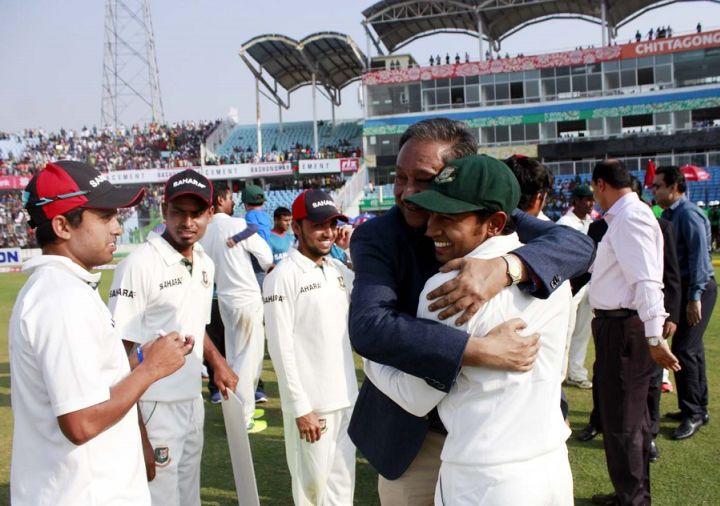BCB's move could affect independence of selection process
The implementation of the new system comprising a selection panel and a selection committee could increase the influence the board has on the players chosen for the national team

The BCB's unprecedented decision to split the national team's selection into two steps raises the question about whether the process will remain independent under the new system.
The proposal layers a new selection committee comprising coach Chandika Hathurusingha, team manager Khaled Mahmud and cricket operations chairman Akram Khan on top of the BCB's existing three-man selection panel. The changes were finalised by BCB president Nazmul Hassan after a discussion with with Hathurusingha and some directors, and will be ratified at the next board meeting.
There have been some disagreements over selection - in public on a few occasions - between chief selector Faruque Ahmed and Hathurusingha, and the coach's inclusion in the committee was made with the view of reducing such incidents.
The reasoning behind appointing the cricket operations chairman and the team manager to the committee, however, is less clear.
Khan's cricket operations committee maintains Bangladesh's international and domestic calendar, appoints coaching staff, and draws up contracts of players and coaches. It also compiles tournament bylaws and playing conditions among other duties.
Mahmud wears many hats in Bangladesh cricket - that of BCB director, chairman of the board's game development committee, coach of BPL and Dhaka Premier League sides, and vice-president of Cricketers Welfare Association of Bangladesh. His new role in the selection committee will add to his considerable workload.
After initially stating the team manager would not be part of the selection committee, Hassan said he was included to voice the opinion of the captain at selection meetings. With different captains for different formats, Hassan explained, the manager would be a unifying factor. However, Bangladesh's captains Mashrafe Mortaza and Mushfiqur Rahim have been offering their opinions regularly, so the need for an envoy is a surprise.
Khan and Mahmud are both BCB directors and their inclusion is perhaps the board's indirect way of increasing control over the selection process, a longstanding matter of interest among some officials. When questioned whether the changes would be beneficial in the long term, or were designed for some individuals, the board's response was that the decisions had been taken after studying selection processes of other countries.
A quick survey revealed that while coaches have been part of the selection process in most countries, the team manager has not. At present, only Pakistan team manager Intikhab Alam has some say on tours while selecting the XI, no one else does.
There is history when it comes to the BCB's apparent unease with an independent selection body. In 2015, the board's directors led by president Nazmul Hassan sat the selectors for a two-hour grilling about the World Cup squad. In 2011, BCB chief AHM Mustafa Kamal did the same thing with the Rafiqul Alam-led selection panel before the World Cup squad announcement. In 1999 and 2000, Minhajul Abedin and Habibul Bashar were added to the squads for the World Cup and Bangladesh's inaugural Test by the board, despite the selectors not picking them.
When the BCB's working committee chairman Enayet Hossain Siraj revealed the new proposals, the chief selector Faruque said the next day that he may resign because the independence of the selection panel would be compromised. That same night, Siraj called up the three selectors to soothe any problems.
Faruque has earned a reputation for being strongly opinionated in his first term as selector, so it wouldn't be a surprise if he did resign over the changes to his work environment. The other BCB selectors are Bashar and Minhajul, who as players were affected by selection discrepancies. Minhajul, for example, never played a Test despite being Bangladesh's best batsman when they got Test status. Then there is Khan, who resigned as chief selector when Kamal cut Tamim Iqbal from the 2012 Asia Cup squad. In his playing days, Mahmud was often on the wrong side of the establishment for being a firebrand.
Faruque, Minhajul, Bashar, Mahmud and Khan have been the front line of Bangladesh cricket for decades and are best positioned to resist such a change. Instead, the inclusion of Khan and Mahmud is being seen as one with ulterior motives.
Hathurusingha is new to Bangladesh, and has developed a winning culture within the team. Players appreciate his work and so does the BCB, which has started to rely on him regarding matters apart from coaching the national team. Foreign coaches who have brought success to Bangladesh have been given such importance, but they have also had the rug pulled from beneath their feet when results have been poor. Hathurusingha must be wary of extra duties.
Ultimately, the influence enjoyed by this group of former players charged with significant responsibility in Bangladesh cricket falls short of the power held by the BCB chief Hassan and his directors. And Hassan's administration has also done good work.
After patiently untangling the troubled BPL payment issues between 2012 and 2014, Hassan has seen the board's flagship tournament improve. His disciplinary methods are also often praised for bringing control to player behaviour, which has at times caused problems.
But this change to the selection process is likely to bring Hassan's leadership under scrutiny for the first time since Shakib Al Hasan's banning in 2014. Such a fundamental change could have a lasting impact on the senior team. There is still time for the BCB to run it by their directors one final time, examine it for holes, and see if it will actually benefit Bangladesh cricket in the long run.
Mohammad Isam is ESPNcricinfo's Bangladesh correspondent. @isam84
Read in App
Elevate your reading experience on ESPNcricinfo App.